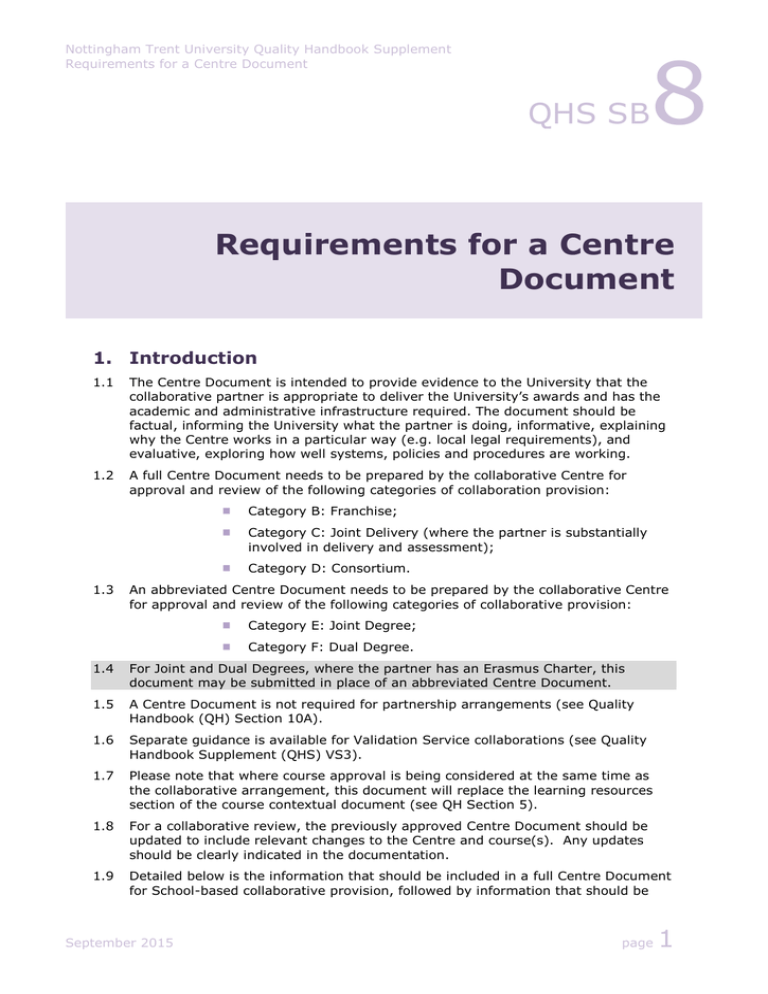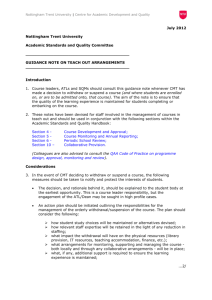8 QHS SB Requirements for a Centre Document
advertisement

Nottingham Trent University Quality Handbook Supplement Requirements for a Centre Document QHS SB 8 Requirements for a Centre Document 1. Introduction 1.1 The Centre Document is intended to provide evidence to the University that the collaborative partner is appropriate to deliver the University’s awards and has the academic and administrative infrastructure required. The document should be factual, informing the University what the partner is doing, informative, explaining why the Centre works in a particular way (e.g. local legal requirements), and evaluative, exploring how well systems, policies and procedures are working. 1.2 A full Centre Document needs to be prepared by the collaborative Centre for approval and review of the following categories of collaboration provision: 1.3 Category B: Franchise; Category C: Joint Delivery (where the partner is substantially involved in delivery and assessment); Category D: Consortium. An abbreviated Centre Document needs to be prepared by the collaborative Centre for approval and review of the following categories of collaborative provision: Category E: Joint Degree; Category F: Dual Degree. 1.4 For Joint and Dual Degrees, where the partner has an Erasmus Charter, this document may be submitted in place of an abbreviated Centre Document. 1.5 A Centre Document is not required for partnership arrangements (see Quality Handbook (QH) Section 10A). 1.6 Separate guidance is available for Validation Service collaborations (see Quality Handbook Supplement (QHS) VS3). 1.7 Please note that where course approval is being considered at the same time as the collaborative arrangement, this document will replace the learning resources section of the course contextual document (see QH Section 5). 1.8 For a collaborative review, the previously approved Centre Document should be updated to include relevant changes to the Centre and course(s). Any updates should be clearly indicated in the documentation. 1.9 Detailed below is the information that should be included in a full Centre Document for School-based collaborative provision, followed by information that should be September 2015 page 1 Nottingham Trent University Quality Handbook Supplement Requirements for a Centre Document QHS SB 8 included in an abbreviated Centre Document. Centres are welcome to add any additional information in support of the proposed collaboration that they may wish to provide. 1.10 The Centre Document should also be supported by relevant appendices. 2. Full Centre Approval Document Section 1: Collaborative health Criteria 1: The Centre sustains a culture and ethos appropriate to higher education Brief description of the Centre and its role in the community, including evidence of a shared educational philosophy with NTU or understanding of UK higher education. Nature of the student body and range of courses currently offered (this should include information about all courses– their own courses as well as any already delivered in collaboration with NTU). Strategy for the delivery of higher education courses. A rationale for the proposed collaboration. That the Centre understands and agrees to operate the principles and practices established for the collaboration and set out in the Collaborative Framework Document. Criteria 2: The collaborative course is located in an appropriate department and is supported by the Centre, with suitable management and administrative arrangements for delivery A description of the Centre’s organisational arrangements, including departments relevant to the collaboration. The place of the course(s) to be delivered in collaboration with NTU in a departmental/faculty/school context. Management and administrative support for the collaboration, including executive reporting lines. Note September 2015 Diagrams may be helpful in this section to support the text when describing the structure of the organisation, the place of the course within the structure and the management reporting lines. page 2 Nottingham Trent University Quality Handbook Supplement Requirements for a Centre Document QHS SB 8 Section 2: Academic standards Criteria 3: The Centre has the quality management systems in place to take responsibility for and ensure the continuing standard of delivery Details of the quality management arrangements at the Centre and how they will operate for the proposed collaborative course. The composition and function of the course committee (or alternative arrangements) at the Centre and its relationship to the University. Mechanisms for problem resolution within the Centre and through communication with the University. Criteria 4: The staff team at the Centre evaluates the course on a regular basis consistent with the University’s own evaluation procedures The Centre’s principles, policies and practices for managing and enhancing the quality of provision and evidence of a shared philosophy with NTU. Arrangements for the annual monitoring and reporting of the collaborative course(s) within the Centre and mechanisms for ensuring the quality and standards of student learning opportunities. Criteria 5: The staff team at the Centre is able to deliver the course to a standard equivalent to that achieved within the University The Centre’s teaching and learning strategy. Evidence of understanding of academic standards in higher education in the UK and at NTU by Centre staff. Criteria 6: The staff team at the Centre have a shared understanding and philosophical approach to assessment which is consistent with University policy September 2015 The Centre’s assessment strategy, policies and processes. Evidence of a shared philosophical approach to assessment principles. page 3 Nottingham Trent University Quality Handbook Supplement Requirements for a Centre Document QHS SB 8 Section 3: Quality of student learning opportunities Criteria 7: Appropriate provision and opportunities are made for staff development at the Centre, including teaching and learning, research, scholarship and professional activity Staff development policy and practice within the Centre (subject specific and pedagogic). Staff development proposed for Centre staff (and University staff where appropriate) for the introduction of this course(s) and collaboration. Subject-specific professional development of the Centre’s academic staff, in terms of scholarly activity, professional practice and research. Criteria 8: Delivery of the course at the Centre will provide a comparable learning experience to other NTU students Evidence of the Centre’s support for the quality of the student learning opportunities and capacity to enable students to achieve the intended course aims and learning outcomes. Criteria 9: The resource base to underpin the proposed collaborative course is adequate and suitable, including physical accommodation, revenue and capital support, academic and support staff. The Centre has adequate and effective learning resources, including library, computing and other resource based learning to support the proposed provision September 2015 The Centre’s strategy for updating human and physical resources. Details of staffing for the course(s), in terms of academic staff (including staff CVs), technical and administrative support staff. Details of physical accommodation at the Centre that will be used by students on the collaborative course(s). Revenue/capital support. Details of library provision, focusing on that in place to support the course(s), including e-library. Computing facilities and support. Specialist equipment required as identified by the University School to support the delivery of the course(s). Other resources as necessary to support student learning. page 4 Nottingham Trent University Quality Handbook Supplement Requirements for a Centre Document QHS SB 8 Criteria 10: The Centre has adequate and effective student support, including academic support and arrangements for pastoral and counselling support Arrangements for academic support of students (e.g. tutorial support). Arrangements for pastoral and counselling support at the Centre. 3. Abbreviated Centre Approval Document Section 1: Collaborative health Criteria 1: The Centre sustains a culture and ethos appropriate to higher education Brief description of the Centre and its role in the community, including evidence of a shared educational philosophy with NTU. The nature of the student body and range of courses currently offered by the Centre (this should include information about all courses– their own courses as well as any already delivered in collaboration with NTU). The Centre’s strategy for the delivery of higher education courses. Criteria 2: The collaborative course is located in an appropriate department/faculty and is supported by the Centre, with suitable management and administrative arrangements for delivery A description of the Centre’s organisational arrangements. The place of the course(s) to be delivered in collaboration with NTU in a departmental/faculty/school context. Management and administrative support for the course, including executive reporting lines. Section 2: Academic standards Criteria 3: The Centre has the quality management systems in place to take responsibility for and ensure the continuing standard of delivery. September 2015 Details of the quality management arrangements at the Centre and how they will operate for the proposed collaborative course. Arrangements for course annual monitoring, reporting, and review. Mechanisms for problem resolution within the Centre and through communication with the University. page 5 Nottingham Trent University Quality Handbook Supplement Requirements for a Centre Document QHS SB Criteria 4: 8 The Centre evaluates the course on a regular basis The Centre’s principles, policies and practices for managing and enhancing the quality of provision and evidence of a shared philosophy with NTU. Arrangements for the annual monitoring and reporting of the collaborative course(s) within the Centre and mechanisms for ensuring the quality and standards of student learning opportunities. Section 3: Quality of student learning opportunities Criteria 5: Appropriate provision and opportunities are made for staff development at the Centre for research, scholarship and professional activity Staff development policy and practice within the Centre (subject specific and pedagogic). Joint staff development proposed for the introduction of this course(s) and collaboration. Criteria 6: The Centre’s approach to teaching, learning and assessment The Centre’s teaching and learning strategy, and evidence of a shared philosophy with NTU. The Centre’s assessment principles, policies and practices and evidence of shared philosophy with NTU. Criteria 7: Delivery of the course at the Centre will provide a comparable learning experience to other NTU students The Centre’s strategy for supporting the quality of student learning opportunities. Criteria 8: The Centre has comparable learning resources, including library, computing and other resource based learning to support the proposed provision September 2015 The Centre’s strategy for updating human and physical resources. Details of staffing for the course(s). Details of physical accommodation at the Centre that will be used by students on the collaborative course(s). Details of library provision, focusing on that in place to support the course(s). Computing facilities and support. page 6 Nottingham Trent University Quality Handbook Supplement Requirements for a Centre Document QHS SB 8 Criteria 9: The Centre has comparable student support systems, including academic support and arrangements for pastoral and counselling support September 2015 Arrangements for academic support of students (e.g. tutorial support). Arrangements for pastoral and counselling support at the Centre. page 7
